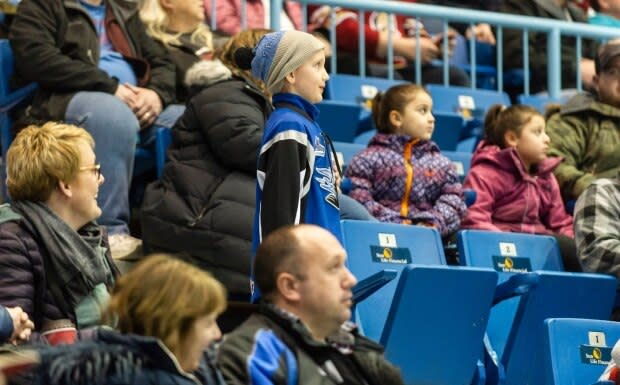Major junior hockey teams optimistic about fall season
New Brunswick's major junior hockey teams are hoping to be on the ice in October.
The Saint John Sea Dogs, Moncton Wildcats and Acadie-Bathurst Titan are part of the Quebec Major Junior league.
But officials with all three teams said they may not play any games in Quebec for the duration of the next regular season.
The details for a return to play are still being worked out, said Trevor Georgie, the Sea Dogs' president and general manager.
However, a plan is being discussed for a 60-game regular season, he said, to be played exclusively in the Maritime provinces.
Sylvain Couturier, general manager of the Titan, and Courtney Huestis, marketing and communications manager for the Wildcats, both confirmed that proposal was being discussed.
The other Maritime-based teams are the Cape Breton Eagles, Charlottetown Islanders and Halifax Mooseheads.
Normally, each team would play 68 games in the regular season, and face off against every team in the league, including the 12 teams in Quebec, at least a couple of times.
The QMJHL and its umbrella group, the CHL, are working with the different levels of government to plan for inter-provincial travel during the playoffs, said Georgie, possibly beginning in March, and to facilitate the arrival of international players.
Georgie expects that will be complicated.
Even players from Quebec will have to self-isolate before they can start training camp.
Players are expected to arrive in the coming days, said Couturier, and the Titan training camp is tentatively scheduled to begin Aug. 26.
The team has rented a couple of cottages for the players on a private beach, said the general manager.
The players will be well taken care of, said Couturier.

The team will look after their meals and ensure they're following quarantine rules, he said.
A newly hired assistant coach, arriving from Ontario, Dennis Martindale, will be there to supervise the players and lead them through morning workouts, he said.
Those logistics aren't the only factors making things challenging from a business perspective.
Seating capacities at arenas will likely be significantly reduced, said Georgie, along with ticket sale revenue.
"If all goes as planned, the capacity still will be significantly lower than what we'd even have as an average night. … So, a season ticket might be the only opportunity to get in the building here."
Georgie said that will be a change for fans who are used to buying tickets at the last minute.
Capacity will probably be lower than even the current number of season ticket holders, Georgie said, which including sponsor passes, is roughly 1,500.
Junior hockey teams don't typically make big profits at the best of times, he said, and this past season revenues were exceptionally low.
The Sea Dogs last two regular season games, which are typically among the best-attended games of the season, were cancelled, as were the playoffs, in which the team had secured a spot.
Couturier said he hasn't heard any proposals for arena capacity, but if there's no way to make money, there probably won't be a season.
Meanwhile, he said he has confidence in the league leadership and remains optimistic the season will go ahead.
The Wildcats organization said it's "continuing to work closely with government as well as the league to work out details in terms of return to play, player travel and building capacity."
Huestis, the team spokesperson, thanked fans for their patience and said details will be communicated as soon as they are available.

